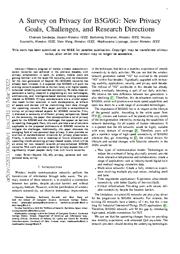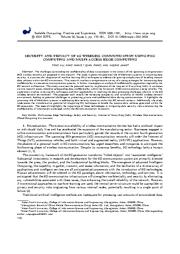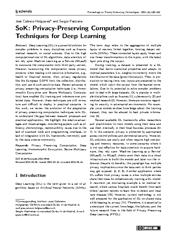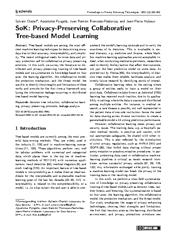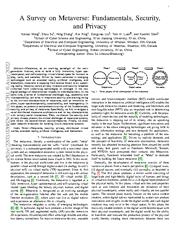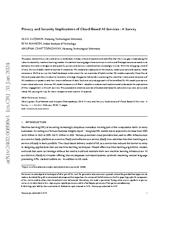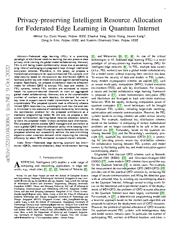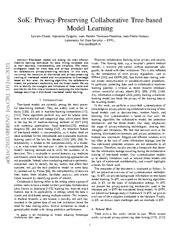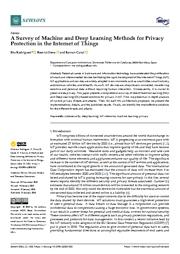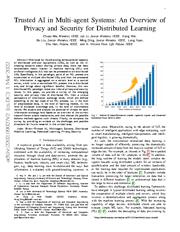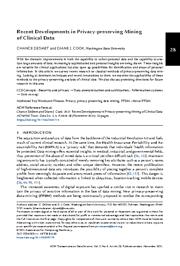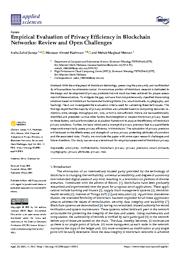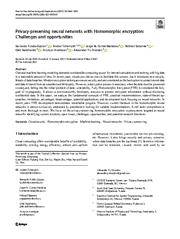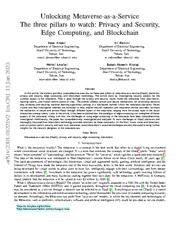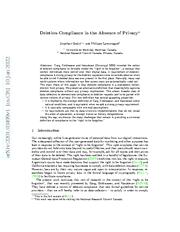A copy of this work was available on the public web and has been preserved in the Wayback Machine. The capture dates from 2022; you can also visit the original URL.
The file type is application/pdf.
Filters
A Survey on Privacy for B5G/6G: New Privacy Goals, Challenges, and Research Directions
[article]
2022
arXiv
pre-print
This paper provides a comprehensive survey on privacy-related aspects for B5G/6G networks. First, it discusses a taxonomy of different privacy perspectives. ...
Based on the taxonomy, the paper then conceptualizes a set of privacy goals for the B5G/6G and the challenges that appear as barriers to reaching these goals. ...
ACKNOWLEDGEMENT This work is partly supported by European Union in SPA-TIAL (Grant No: 101021808), Academy of Finland in 6Genesis (grant no. 318927) and Science Foundation Ireland under CONNECT phase 2 ...
arXiv:2203.04264v1
fatcat:blbzfjy73fhlvammlwsgfmso5y
Security and Privacy of 6G Wireless Communication using Fog Computing and Multi-Access Edge Computing
2024
Scalable Computing : Practice and Experience
This research involves a comprehensive survey of existing strategies for maintaining data confidentiality in automotive communication systems. ...
The proposed work reveals the increasing complexity and variability of the 6G wireless network environment, leading to potential challenges in protecting private and confidential data during communication ...
The concept of quantum computing can be personalised to enhance reliability and increase efficiency in a 6G setting. ...
doi:10.12694/scpe.v25i2.2629
fatcat:2ujnldoo5fgtlf3bfetd2bo5yy
SoK: Privacy-Preserving Computation Techniques for Deep Learning
2021
Proceedings on Privacy Enhancing Technologies
Recent advances in privacy-preserving computation techniques (i.e., Homomorphic Encryption and Secure Multiparty Computation) have enabled DL training and inference over protected data. ...
Due to the high computational cost of DL algorithms, data scientists often rely upon Machine Learning as a Service (MLaaS) to outsource the computation onto third-party servers. ...
Acknowledgments We thank the anonymous reviewers and our shepherd, Phillipp Schoppmann, for their valuable feedback. We also thank Alberto Di Meglio, Marco Manca ...
doi:10.2478/popets-2021-0064
fatcat:hb3kdruxozbspnowy63gynuapy
SoK: Privacy-Preserving Collaborative Tree-based Model Learning
2021
Proceedings on Privacy Enhancing Technologies
In this work, we survey the literature on distributed and privacy-preserving training of tree-based models and we systematize its knowledge based on four axes: the learning algorithm, the collaborative ...
The recent orthogonal needs for more data and privacy protection call for collaborative privacy-preserving solutions. ...
We are also grateful to Giovanni Cherubin, Andrew Janowczyk, Peizhao Hu, and the members of the EPFL Laboratory for Data Security for their helpful comments and suggestions. ...
doi:10.2478/popets-2021-0043
fatcat:zjlt2fgmpfcw7modhaddyqc46i
A Survey on Metaverse: Fundamentals, Security, and Privacy
[article]
2022
arXiv
pre-print
In this paper, we present a comprehensive survey of the fundamentals, security, and privacy of metaverse. ...
Then, we discuss the security and privacy threats, present the critical challenges of metaverse systems, and review the state-of-the-art countermeasures. ...
U20A20175, U1808207), and the Fundamental Research Funds for the Central Universities. ...
arXiv:2203.02662v3
fatcat:iudwizbvp5cv3fga6lpvydlrna
Privacy and Security Implications of Cloud-Based AI Services : A Survey
[article]
2024
arXiv
pre-print
We first survey the AIaaS landscape to document the various kinds of liabilities that ML models, especially Deep Neural Networks pose and then introduce a taxonomy to bridge this gap by holistically examining ...
This paper details the privacy and security landscape in today's cloud ecosystem and identifies that there is a gap in addressing the risks introduced by machine learning models. ...
Any opinions, findings and conclusions or recommendations expressed in this material are those of the author(s) and do not reflect the views of National Research Foundation, Singapore. ...
arXiv:2402.00896v1
fatcat:skmxehukqnd47hzf7t73tayjy4
Privacy-preserving Intelligent Resource Allocation for Federated Edge Learning in Quantum Internet
[article]
2022
arXiv
pre-print
Therefore, in this paper, we propose a hierarchical architecture for quantum-secured FEL systems with ideal security based on the quantum key distribution (QKD) to facilitate public key and model encryption ...
Federated edge learning (FEL) is a promising paradigm of distributed machine learning that can preserve data privacy while training the global model collaboratively. ...
Within a QKD node, there is a global key server (GKS), a local key manager (LKM), and one or more quantum transmitters (QTs). ...
arXiv:2210.04308v1
fatcat:ljqtfiq6nvcirhxfp665vbq2ju
SoK: Privacy-Preserving Collaborative Tree-based Model Learning
[article]
2021
arXiv
pre-print
In this work, we survey the literature on distributed and privacy-preserving training of tree-based models and we systematize its knowledge based on four axes: the learning algorithm, the collaborative ...
The recent orthogonal needs for more data and privacy protection call for collaborative privacy-preserving solutions. ...
We are also grateful to Giovanni Cherubin, Andrew Janowczyk, Peizhao Hu, and the members of the EPFL Laboratory for Data Security for their helpful comments and suggestions. ...
arXiv:2103.08987v2
fatcat:3c6axws5zbeptn5q3bjomusbg4
A Survey of Machine and Deep Learning Methods for Privacy Protection in the Internet of Things
2023
Sensors
This paper presents a comprehensive survey of recent Machine Learning (ML)- and Deep Learning (DL)-based solutions for privacy in IoT. ...
First, we present an in depth analysis of current privacy threats and attacks. Then, for each ML architecture proposed, we present the implementations, details, and the published results. ...
Cybersecurity ML IoT
Surveys on Privacy on Non-IoT Environments ML-based privacy protection surveys for mobile networks and cloud computing scenarios have been published in recent years. ...
doi:10.3390/s23031252
pmid:36772292
pmcid:PMC9921397
fatcat:sfoc5s7zqfht7cmggxoaafgdmi
Trusted AI in Multi-agent Systems: An Overview of Privacy and Security for Distributed Learning
[article]
2023
arXiv
pre-print
In this paper, we provide a survey of the emerging security and privacy risks of distributed ML from a unique perspective of information exchange levels, which are defined according to the key steps of ...
a centralized ML process into a distributed one, and brings about significant benefits. ...
Quantum computing operates on the basis of quantum mechanics, taking advantage of superposition to store and process information [277] , [278] . ...
arXiv:2202.09027v3
fatcat:fbcq4bjcd5ebdc526pgzsnjaiy
Recent Developments in Privacy-preserving Mining of Clinical Data
2021
ACM/IMS Transactions on Data Science
In this article, we survey recent research on classical methods of privacy-preserving data mining. ...
Looking at dominant techniques and recent innovations to them, we examine the applicability of these methods to the privacy-preserving analysis of clinical data. ...
Finally, Aaronson and Rothburn showed how a differential privacy-satisfying level of added noise can be abstracted to the gentle measurement of quantum states [1] . ...
doi:10.1145/3447774
pmid:35018368
pmcid:PMC8746818
fatcat:b43kc4hrhnfzzlcn5tzhai2ane
Empirical Evaluation of Privacy Efficiency in Blockchain Networks: Review and Open Challenges
2021
Applied Sciences
The calculation of privacy precision will be based on the effectiveness and strength of various privacy protecting attributes of a solution and the associated risks. ...
The findings depict that the majority of privacy solutions are validated based on computing resources i.e., memory, time, storage, throughput, etc., only, which is not sufficient. ...
We infer that this study will enable successful development, deployment, testing, and empirical evaluation of privacy preserving techniques in blockchain networks, being a key driving force for future ...
doi:10.3390/app11157013
fatcat:3pvl77nsrbg63ntf6g3hoejwpu
Privacy-preserving neural networks with Homomorphic encryption: Challenges and opportunities
2021
Peer-to-Peer Networking and Applications
AbstractClassical machine learning modeling demands considerable computing power for internal calculations and training with big data in a reasonable amount of time. ...
We focus on the privacy-preserving homomorphic encryption cryptosystems targeted at neural networks identifying current solutions, open issues, challenges, opportunities, and potential research directions ...
Acknowledgments This work was supported by the Ministry of Education and Science of the Russian Federation (Project 075-15-2020-788). ...
doi:10.1007/s12083-021-01076-8
fatcat:4ol6i5goizezxfbu24clxlfugu
Unlocking Metaverse-as-a-Service The three pillars to watch: Privacy and Security, Edge Computing, and Blockchain
[article]
2023
arXiv
pre-print
In this article, the authors provide a comprehensive overview on three core pillars of metaverse-as-a-service (MaaS) platforms; privacy and security, edge computing, and blockchain technology. ...
Then it goes through the privacy and security issues inside the metaverse from data-centric, learning-centric, and human-centric points-of-view. ...
For a survey on the edge computing market, see [58] . An edge computing system includes the internet gateway, edge servers, and perception layer [59] . ...
arXiv:2301.01221v2
fatcat:njzop26brrculbncsuxhhry6c4
Deletion-Compliance in the Absence of Privacy
[article]
2022
arXiv
pre-print
Our new definition has several appealing properties: - It is implied by the stronger definition of Garg et al. under natural conditions, and is equivalent when we add a privacy requirement. - It is naturally ...
This allows broader class of data collectors to demonstrate compliance to deletion requests and to be paired with various notions of privacy. ...
Cohen and Nissim [CN20] tackle this task of bridging legal and formal notions of privacy for the GDPR legislation [GDPR] . ...
arXiv:2201.03499v1
fatcat:hv4zjbxlqbek7fdqsa36axkhdm
« Previous
Showing results 1 — 15 out of 1,855 results

